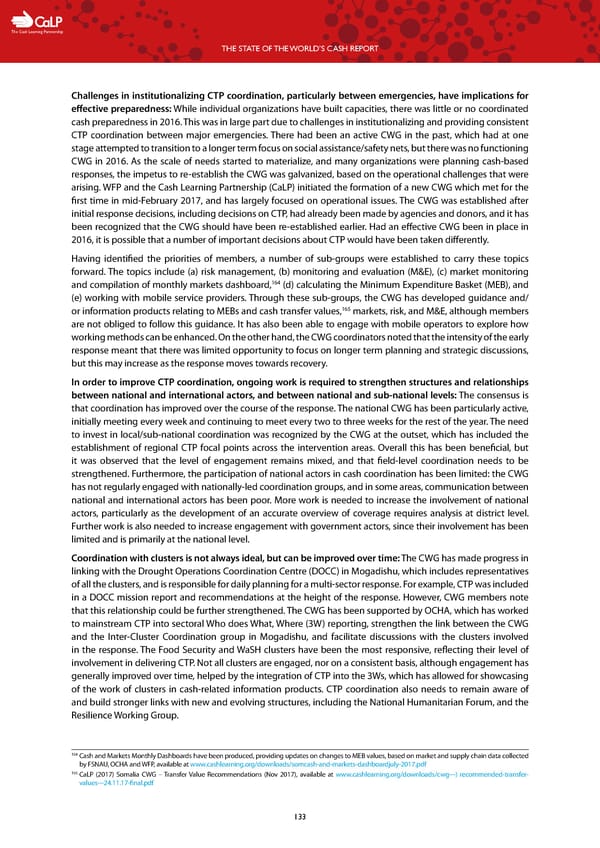C The Cash Learning Partnership THE STATE OF THE WORLD’S CASH REPORT Challenges in institutionalizing CTP coordination, particularly between emergencies, have implications for effective preparedness: While individual organizations have built capacities, there was little or no coordinated cash preparedness in 2016. This was in large part due to challenges in institutionalizing and providing consistent CTP coordination between major emergencies. There had been an active CWG in the past, which had at one stage attempted to transition to a longer term focus on social assistance/safety nets, but there was no functioning CWG in 2016. As the scale of needs started to materialize, and many organizations were planning cash-based responses, the impetus to re-establish the CWG was galvanized, based on the operational challenges that were arising. WFP and the Cash Learning Partnership (CaLP) initiated the formation of a new CWG which met for the first time in mid-February 2017, and has largely focused on operational issues. The CWG was established after initial response decisions, including decisions on CTP, had already been made by agencies and donors, and it has been recognized that the CWG should have been re-established earlier. Had an effective CWG been in place in 2016, it is possible that a number of important decisions about CTP would have been taken differently. Having identified the priorities of members, a number of sub-groups were established to carry these topics forward. The topics include (a) risk management, (b) monitoring and evaluation (M&E), (c) market monitoring 164 and compilation of monthly markets dashboard, (d) calculating the Minimum Expenditure Basket (MEB), and (e) working with mobile service providers. Through these sub-groups, the CWG has developed guidance and/ 165 or information products relating to MEBs and cash transfer values, markets, risk, and M&E, although members are not obliged to follow this guidance. It has also been able to engage with mobile operators to explore how working methods can be enhanced. On the other hand, the CWG coordinators noted that the intensity of the early response meant that there was limited opportunity to focus on longer term planning and strategic discussions, but this may increase as the response moves towards recovery. In order to improve CTP coordination, ongoing work is required to strengthen structures and relationships between national and international actors, and between national and sub-national levels: The consensus is that coordination has improved over the course of the response. The national CWG has been particularly active, initially meeting every week and continuing to meet every two to three weeks for the rest of the year. The need to invest in local/sub-national coordination was recognized by the CWG at the outset, which has included the establishment of regional CTP focal points across the intervention areas. Overall this has been beneficial, but it was observed that the level of engagement remains mixed, and that field-level coordination needs to be strengthened. Furthermore, the participation of national actors in cash coordination has been limited: the CWG has not regularly engaged with nationally-led coordination groups, and in some areas, communication between national and international actors has been poor. More work is needed to increase the involvement of national actors, particularly as the development of an accurate overview of coverage requires analysis at district level. Further work is also needed to increase engagement with government actors, since their involvement has been limited and is primarily at the national level. Coordination with clusters is not always ideal, but can be improved over time: The CWG has made progress in linking with the Drought Operations Coordination Centre (DOCC) in Mogadishu, which includes representatives of all the clusters, and is responsible for daily planning for a multi-sector response. For example, CTP was included in a DOCC mission report and recommendations at the height of the response. However, CWG members note that this relationship could be further strengthened. The CWG has been supported by OCHA, which has worked to mainstream CTP into sectoral Who does What, Where (3W) reporting, strengthen the link between the CWG and the Inter-Cluster Coordination group in Mogadishu, and facilitate discussions with the clusters involved in the response. The Food Security and WaSH clusters have been the most responsive, reflecting their level of involvement in delivering CTP. Not all clusters are engaged, nor on a consistent basis, although engagement has generally improved over time, helped by the integration of CTP into the 3Ws, which has allowed for showcasing of the work of clusters in cash-related information products. CTP coordination also needs to remain aware of and build stronger links with new and evolving structures, including the National Humanitarian Forum, and the Resilience Working Group. 164 Cash and Markets Monthly Dashboards have been produced, providing updates on changes to MEB values, based on market and supply chain data collected by FSNAU, OCHA and WFP, available at www.cashlearning.org/downloads/somcash-and-markets-dashboardjuly-2017.pdf 165 CaLP (2017) Somalia CWG – Transfer Value Recommendations (Nov 2017), available at www.cashlearning.org/downloads/cwg---) recommended-transfer- values---24.11.17-final.pdf 133
 The State of the World's Cash | Full Report Page 134 Page 136
The State of the World's Cash | Full Report Page 134 Page 136